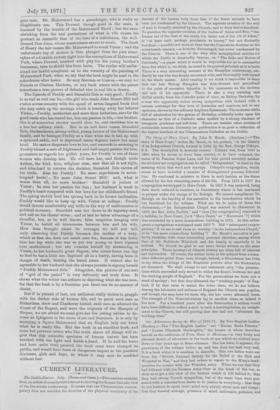CURRENT LITERATURE.
The Dublin Review. July. (Burns and Oates.)--This number contains, ifIrst, an article of considerable interest as showing the Roman Catholic view -of the Darwinian controversy. It BOOMS that our Ultramentano contem- porary does not consider the doctrine of the physical continuity of the descent of tho human body from that of the lower animals to have been yet condemned by the °buret. The separate creation of the soul of man is formally asserted by the Church, and to deny that is heretical. To question the separate creation of the bodies of Adam and Eve, " the former out of the dust of the earth, the latter out of the rib of Adam," is " at least rash, perhaps proximate to heresy," but not distinctly heretical ;—possibly not more so than was the Copernican doctrine in the seventeenth eentury,—a doctrine discouraged, but never condemned by the Church. There is one of the very able metaphysical articles for which the Dublin is deservedly famous, on " The Rule and Motive of Certitude,"—a paper which it would be impossible for us to summarize here, but which is, we think, as sound in its general principle as it is lucid. There le it very interesting account of the Hampden controversy, evi- dently by one who was deeply concerned with, and thoroughly well versed in, the whole matter. After reading it we think it impossible to deny that our late Bishop Hampden was thin-skinned and prejudiced to the point of excessive injustice in his comments on the motives and ads of his opponents. There is also a very amusing and. Bkilful article, from the Catholic point of view, on Bishop Berkeley, by a man who apparently unites strong sympathies with Ireland with a certain contempt for that love of decencies and comforts, not to say opulence, shown by the ordinary Anglican Episcopate. The reviewer while full of admiration for the genius of Berkeley, evidently looks upon his character as that of a Catholic saint spoiled by a strong tincture of bourgeois prudence and self-love. There are besides other articles of cosiderable interest. Certainly no publication is so good a reflection of the higher intellect of the Ultratuontiatte Catholics as the Dublin.
































 Previous page
Previous page